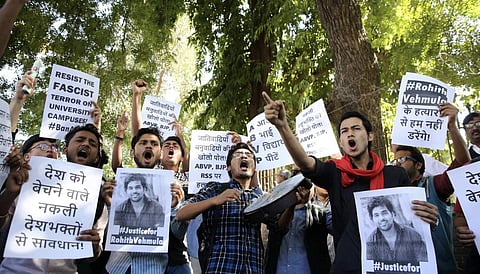

In the light of Delhi University Students Union (DUSU) on September 22, Friday, let us look at a few student movements in India which went on to shape the trajectory of the entire nation.
Naxalite movement (late 1960s)
Originating as a peasant uprising in Naxalbari, West Bengal, 1967, it ignited revolutionary fervour among late 1960s students, influencing a generation. This marked one of the first major student movements in Independent India, even drawing participants from prestigious colleges like St Stephen’s, Delhi. Even individuals like Rajiv Kumar (NITI Aayog Vice-Chairman) had embraced Naxalism. What began as a village revolt on May 25, 1967, in West Bengal's Naxalbari, turned into a symbol of revolutionary zeal for students of that era.
Sitaram Yechury's call for Indira Gandhi's resignation (1977)
During the post-Emergency period, Sitaram Yechury, the then President of Jawaharlal Nehru University (JNU) Students Union, played a pivotal role in demanding the resignation of Prime Minister Indira Gandhi as Chancellor of university. One of the iconic images from this movement is him standing next to her and reading out the reasons why she should step down. His leadership marked a significant shift in Indian student activism against authoritarianism. An entire generation of India’s political leaders emerged from this Jayaprakash Narayan (JP) movement against the Emergency declared.
Assam Movement (1979-1985)
The "Assam Agitation," led by students against illegal immigration, spurred discussions on identity, citizenship, and regional politics. Seen as a milestone in Indian student activism, some like Prafulla Kumar Mahanta transitioned from university hostels to the state assembly. The Assam Accord, signed on August 15, 1985, between AASU and the Central government, marked its conclusion.
Anti-Mandal Commission protests (1990)
From the turbulence of the 1980s emerged the 1990s, marked by students self-immolating during the Mandal agitation. The nationwide student movement against the implementation of the Mandal Commission's recommendation for reservations in higher education marked a turning point in Indian politics.
Justice for Nirbhaya protests (2012)
The brutal gang rape and subsequent death of a young woman in Delhi led to massive protests by students demanding justice and safer cities for women. This movement sparked conversations about gender equality and violence against women. This movement sparked conversations on gender parity and violence against women, leading to significant legal reforms, the establishment of fast-track courts, and reinforced public discourse on women's safety.
Hokkolorob Movement (2014)
Sparked by the alleged molestation of a female student, the Hokkolorob movement at Jadavpur University became a symbol of resistance against gender-based violence. The movement gathered momentum, leading to dialogues about safety on campuses and women's rights.
Telangana Movement (1969 - 2014)
The Telangana movement witnessed widespread student protests for a separate state. Students played an instrumental role in shaping the discourse around regional identity and governance, leading to the eventual formation of Telangana in 2014. Under the leadership of K Chandrashekhar Rao and the Telangana Rashtriya Samiti (TRS, now Bharat Rashtra Samithi (BRS)), the movement gained momentum as a predominantly student-driven agitation. Notably, campaigns like "jail-bharo" (fill the jails) gained traction, with active participation from Osmania University and the University of Hyderabad.
Rohith Vemula's suicide (2016)
The tragic suicide of Rohith Vemula, a Dalit student, triggered protests against caste-based discrimination in educational institutions. His poignant suicide note voiced the anguish of a tormented mind, challenging society's reduction of individuals to mere identities. The incident reshaped caste conversations and energised student politics across the nation. “The value of a man was reduced to his immediate identity and nearest possibility. To a vote. To a number. To a thing. Never was a man treated as a mind. As a glorious thing made up of stardust. In every field, in studies, in streets, in politics, and in dying and living,” stated the letter.
Kanhaiya Kumar's speech at JNU (2016)
Kanhaiya Kumar's arrest following a speech on March 3, 2016 at Jawaharlal Nehru University (JNU) led to widespread protests across the country. Championing the cry of 'Azadi' (freedom), through his speech he sought not freedom from India, but freedom within India. The incident highlighted issues of freedom of expression and nationalism, sparking debates on the role of students in shaping India's political landscape.
Citizenship Amendment Act (CAA) Protests (2019-2020)
Students across the country participated in protests against the CAA, which they viewed as discriminatory and against the secular fabric of the nation. The movement spotlighted concerns about citizenship, identity, and constitutional rights. A significant viral image from the December 15, 2019 protest captured 22-year-old Ayesha Renna of Jamia Millia Islamia, accompanied by two fellow students, shielding a friend from being subjected to unwarranted force by Delhi police. Ayesha warning the police of their brutal behaviour became an iconic image of the movement that transformed her into an emblem of women in hijab breaking stereotypes and standing up for their rights.
Farmers' Solidarity Protests (2020-2021)
While not exclusively a student movement, many students joined the massive protests against controversial agricultural reforms. The solidarity between students and farmers showcased the importance of diverse voices in advocating for policy change. The movement also saw the arrest and political intimidation of many student political leaders and activists.
